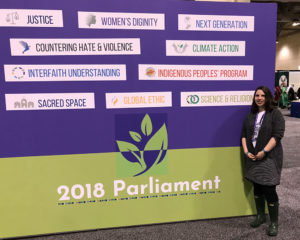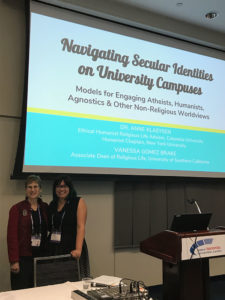Humanist Wave at Parliament of the World’s Religions

While the US faced the 2018 midterm elections, I began my November in Toronto at the Parliament of the World’s Religions—billed as the “oldest, largest, most diverse, and inclusive global interfaith” gathering on the planet. This was the sixth such event since 1993, which celebrated the centennial of the first World’s Parliament of Religions, held in connection with the 1893 Chicago World’s Fair.
This year’s theme was “The Promise of Inclusion, The Power of Love: Pursuing Global Understanding, Reconciliation, and Change.” It was fitting to hold the event in Toronto, which was named the most culturally diverse city in 2016 and is often among the top ten most appealing destinations internationally.
Over seven days, 10,000 people from over seventy countries and across the religious spectrum gathered for workshops, discussions, research presentations, films, meditations, performances, art exhibits, and speeches on six major tracks:
- The Women’s Track: The Dignity of Women Across the World’s Wisdom Traditions
- Countering War, Hate & Violence Track: Peace and Love: Not War, Hate & Violence
- Climate Action Track: Care for Our Earth, Responsibility for Our Future
- The Indigenous Peoples’ Track: The Spiritual Evolution of Humanity & Healing Our Mother Earth
- The Next Generations Track: Interfaith Has No Age, Youth Voices for Change
- Justice: Advancing Concrete Change Toward a Just, Peaceful, and Sustainable World
Parliament, as attendees call it, is a unique opportunity to explore various traditions. Participants are invited to learn how to tie a turban or dress as a Zoroastrian, join in song and dance, create jewelry and peace flags, contribute to quilts and murals, gather in tipis (inside and outside the convention center), breathe in aromas of spices or sage, and simply enjoy each other’s company. Each day the Sikh community prepares a Langar—a free meal served to visitors of any religion, caste, gender, economic status, or ethnicity. We remove our shoes and accept a head covering and blessing before receiving a warm vegan meal and then sitting on the floor together to eat. Volunteers offer refills, and leftovers are donated to local homeless shelters.

Dr. Anne Klaeysen and Vanessa Gomez Brake
Humanists have attended the Parliament of the World’s Religions since 1893, and our presence has become stronger in recent years. (Read Rev. Kathleen A. Green’s piece about the 2015 Parliament in Salt Lake City.) The American Humanist Association (AHA) booth had a great spot in the exhibit hall and people were very appreciative that we were there. They especially enjoyed our “I Believe in Good” stickers, “I’m a Humanist” buttons, and Pathways to Humanism brochure series.
This year there were over a dozen workshops that discussed humanism, atheism, or the growing non-religious population. AHA members Dr. Anne Klaeysen and Vanessa Gomez Brake presented on engaging secular identities on university campuses, and I presented on how millennials are a more secular, diverse, and inclusive generation. Nontheists were also recognized in all of the plenary sessions and the closing ceremony.
During a special press conference on November 6, former Canadian Prime Minister Kim Campbell said,
There are universal values that humanists and people of all faiths honor and pursue that work at all levels of society. Nations, like individuals, must learn to treat one another as they want to be treated. Good relations between nations and good governance within any nation rests on this principle. Religions can advance human unity or be distorted as stimulants for violence.
Audrey Kitagawa, the incoming chair of the Parliament of World’s Religions, was also at the press conference and stated that
Through cooperative actions that are firmly grounded in values that express love, compassion, and caring for all sentient beings we can be assured of a present and future that creates the legacy of justice, dignity and respect for all.
Sounds like humanism to me.
A great workshop by Russell C.D. Arnold and Amanda Hine of Regis University encouraged participants to explore their personal values and discuss them with others without being deterred by labels. We each received a paper with a “Way of Life Wheel” that was divided into categories such as “beliefs about god(s),” “community associations,” “beliefs about human nature,” “sexuality,” “moral values or principles,” etc. There was an inner circle for aspects that were a priority to us and an outer circle for less important ideas. Upon sharing in one-on-one conversations, we learned a lot about each other in only a couple minutes. While labels can be useful in intersectional work to fully acknowledge what makes a person whole, they can also distract us from getting to know a person without assumptions.
This lesson is essential to Parliament of the World’s Religions, which affirms “human unity, commit to protecting the sacred web of life, and working together to advance the values of compassion, peace, and service.” I hope we will continue to have a strong humanist presence at all future Parliaments to come.
You can watch videos from 2018 events on Facebook here.
